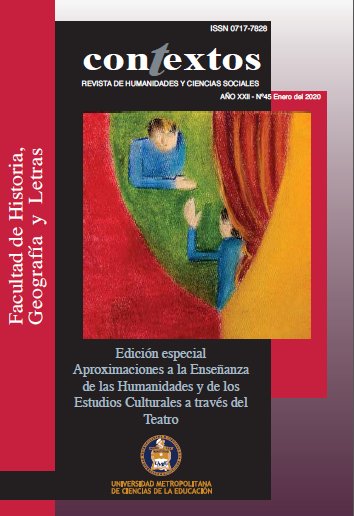Main Article Content
Jan 15, 2020
Abstract
David Arancibia Urzúa’s play, Ñuke, depicts the life of a Mapuche family in Araucanía, and the different forms of violence that its members have to face every day. The conflict between the State of Chile and the Mapuche people has been a subject of public debate for several years. However, since the murder of Camilo Catrillanca, the debate regarding the legitimacy of Mapuche people’s demands and the violence experienced by several Mapuche communities has intensified. In the following pages I will describe the project my research on Arancibia’s work is based upon. Then, I will address the obstacles that the incorporation of drama –as a literary genre— to the reading lists at high school level in Chile entail. Later, I will introduce the play Ñuke, its features as a piece of dramatic art and the particularities of its staging in connection with documentary theatre. Finally, I will focus on my own experience teaching Ñuke in high school.
Downloads
Policies for open access journals
Authors who publish here accept the following terms: Authors will keep their copyright and will guarantee the journal the right to the first publication of their work, which will be subject to the Licence of Creative Commons acknowledgement, which allows for the use of this material only if the authorship is credited and the original source is acknowledged (the journal’s URL), and if it is not used with commercial ends and with any derivations of the original work.
Authors may adopt other non-exclusive license agreements of distribution of the published version (e.g. to save it onto a digital institutional archive or publish it in a monographic volume) only if the initial publication of this journal is indicated.
It is permitted and recommended for authors to divulge their work on the Internet (e.g. institutional digital archives or webpage) before and during the submission process, which may lead to interesting exchanges and increase the citations of the publication. (See Open Access Effect).






